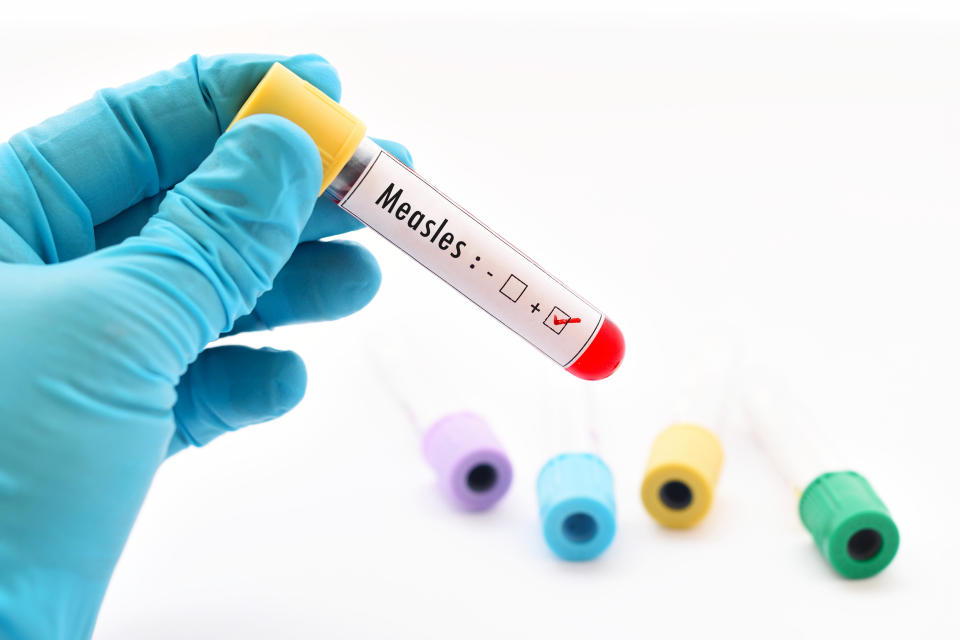Health officials warn GTA after confirmed measles case: What you need to know

Officials have issued a warning for the Halton Region after confirming a case of measles in the Burlington, Ont. area.
The Halton health department is advising the public to ensure their immunization is up to date as they continue to investigate potential public exposures by an adult with measles between Dec. 13-17.
According to the region, anyone who has visited a handful of Toronto and Niagara Falls-area bars, hotels and restaurants may have been exposed to the virus.
“With a case of confirmed measles in our community, it’s imperative that residents protect themselves and their community against the increasing risk of infection by ensuring their measles immunization is up to date,” said Dr. Hamidah Meghani, Medical Officer of Health for Halton Region.
ALSO SEE: Woman loses multiple limbs and is fighting for her life after contracting toxic shock syndrome
About measles
Measles, also known as rubeola, is a highly contagious airborne virus that can live in the nose, mouth, eyes and skin. According to the Centers for Disease Control (CDC) the virus can live for up to two hours in the space where an infected person has coughed or sneezed.
Signs and Symptoms
Symptoms of infection typically appear within 7-14 days after infection, and present with a high fiver, cough, runny nose and conjunctivitis (red, watery eyes). Shortly after symptoms begin, tiny white dots known as koplik spots may appear inside the mouth.
The measles rash can appear three to five days after symptoms begin, with flat red spots accompanied by a fever. The rash often appears on the face and spreads to the rest of the body.
ALSO SEE: Does a hangover cure exist? Canadian author thinks he may have found it
Treatment
There is no set treatment for the measles virus, however it is possible to reduce the accompanying fever by taking acetaminophen, ibuprofen and naproxen.
Complications
Although measles is a serious illness for all age groups, children under the age of 5 and adults over 20 are more likely to suffer complications such as ear infections and diarrhea.
More severe complications such as pneumonia and swelling of the brain may occur and require hospitalization.
According to the CDC, for every 1,000 children diagnosed with measles, one or two will die.
Preventing measles
Measles can be prevented by staying up to date on vaccinations. The measles-mumps-rubella (MMR) or measles-mumps-rubella-varicella (MMRV) immunization is often given to children 12 to 15 months old, again at 18 months and once more between the ages of 4 and 6.
For anyone who hasn’t been immunized, including infants) a post-exposure vaccine is available within 72-hours of exposure to the measles virus.
ALSO SEE: Some hyperactive kids may actually have sleep apnea, not ADHD
Are measles the same as chicken pox?
Although both Measles and chicken pox present with rashes, they are caused by two separate illnesses caused by two different viruses.
Chicken pox are caused by the varicella-zoster virus and causes a pinkish red blister-like rash as well as fever.
Both the measles and chicken pox vaccines are available, and can decrease chances of developing the virus. However it is still possible for someone with the chicken pox vaccine to develop a milder form of the virus.
What to do after exposure
If you believe you have been exposed to measles virus, contact your doctor or public health department immediately.
It is crucial that you call your doctors office, walk-in clinic, or emergency department before you arrive and inform staff of your potential exposure. This can help staff minimize the risk of exposing others to the infection.
Let us know what you think by commenting below and tweeting @YahooStyleCA!
Follow us on Twitter and Instagram.
Check out Yahoo Canada’s podcast, Make It Reign — our hot takes on all things royals in a non-stuffy way — on Apple Podcasts and Google Podcasts.


